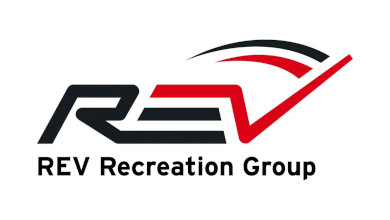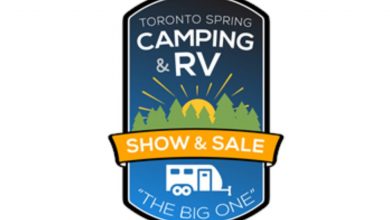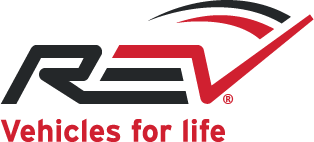Lancaster Log Cabins’ Rustic Park Models for Campgrounds & Resorts
Lancaster Log Cabins targets a growing outdoor hospitality market with its modern take on park models.
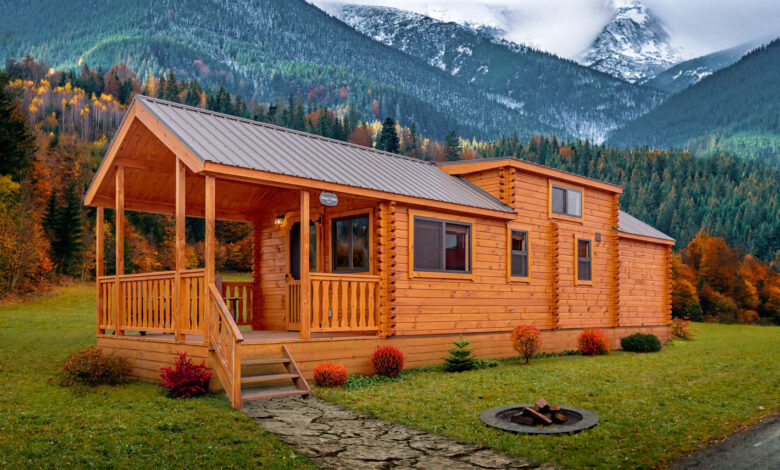
When Dan Smucker founded Lancaster Log Cabins in 2016, he had a simple vision: craft high-quality log cabins on wheels that delivered durability and rustic charm to the outdoor hospitality industry.
Fast-forward to today, and that vision has matured into one of the most respected park model RV manufacturing operations in the country — serving RV parks, campgrounds and private buyers with over 600 units annually from its facility in Lancaster County, Pennsylvania.
Smucker’s almost decade-long journey actually started much earlier, when he worked with his father in the traditional log home kit business.
“It was just the two of us for a while,” he recalls.
It wasn’t until the 2008 recession rattled the housing industry that Smucker first considered a pivot. Instead of shipping out kits for on-site assembly, he soon began manufacturing fully finished, towable log cabins. With that, Lancaster Log Cabins was born.
A Niche in a Growing Industry
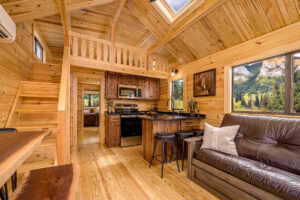 The cabins from Lancaster Log Cabins are classified as park model RVs — mobile units designed for temporary recreational use, a classification that offers a few regulatory advantages for campgrounds.
The cabins from Lancaster Log Cabins are classified as park model RVs — mobile units designed for temporary recreational use, a classification that offers a few regulatory advantages for campgrounds.
Smucker, president and owner of the company, explains that park models are officially designated as a park model RV by the RV Industry Association (RVIA).
“So, they have a VIN number and a Manufacturer’s Certificate of Origin (MCO),” he says. “It just makes it so easy on the campground, because they don’t have to worry about permits and property taxes and jumping through all those hoops you normally would for a permanent structure.”
However, despite their mobility, these park model cabins are built with permanence in mind.
“We basically build cabins on wheels, with the rustic charm and outdoorsy look of a log cabin,” Smucker says.
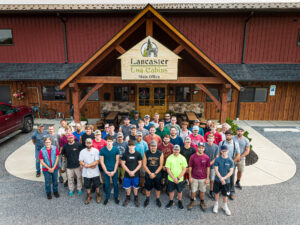 That combination of authenticity and convenience has made Lancaster Log Cabins a popular option in the outdoor hospitality market, serving campgrounds, RV parks and short-term rental platforms like Airbnb and VRBO.
That combination of authenticity and convenience has made Lancaster Log Cabins a popular option in the outdoor hospitality market, serving campgrounds, RV parks and short-term rental platforms like Airbnb and VRBO.
“For campgrounds and RV parks, these units are ideal,” Smucker says. “They don’t require the same red tape as permanent buildings, and they’re ready-to-use right off the truck. They can just park them, and they are ready to go.”
Smucker emphasizes that Lancaster Log Cabins builds with quality and durability in mind — differentiating his product from other park models on the market.
“Other park models are built like a mobile home with cheaper materials that do not hold up as long,” he says. “Ours are built like a real home, and campgrounds appreciate that because they hold up so well.”
While the majority of their business still serves the campground industry — roughly 400 of the 600 units built annually — Lancaster Log Cabins is also seeing a growing retail market. The remaining 200 units are purchased by private customers who use them as hunting cabins, in-law suites, guest houses, Airbnb rentals or simply as a peaceful weekend escape.
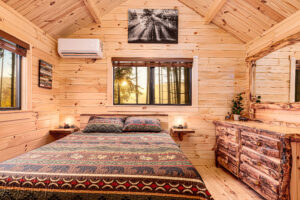 “More people are looking for that simple escape,” Smucker says. “It’s a piece of paradise without the million-dollar price tag.”
“More people are looking for that simple escape,” Smucker says. “It’s a piece of paradise without the million-dollar price tag.”
Still, Smucker urges customers to remember these cabins, while robust and comfortable, are not intended for permanent residential use. “People will try to blur these lines because our units are made for year-round use,” he says. “But the Park 1 RV classification limits them to recreational, temporary use.”
Built To Last, Built With Style
Lancaster Log Cabins distinguishes itself by using traditional log home construction in its mobile structures, creating park models that feel like authentic homes rather than mobile homes.
“Our homes are built like real log cabins — solid, durable and beautiful,” says Smucker.
That commitment to craftsmanship continues inside each unit. From live-edge tables and hickory cabinetry to handcrafted log furniture, the interior finishes reflect the natural, rustic aesthetic that customers seek.
“People staying at a campground more often than not want an outdoorsy feel, inside and out,” he says.
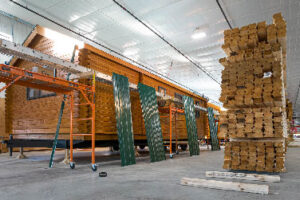 Functionally, the cabins operate much like RVs, with utility hookups designed for simplicity and ease. Each unit includes water, sewer and electrical connections at the rear.
Functionally, the cabins operate much like RVs, with utility hookups designed for simplicity and ease. Each unit includes water, sewer and electrical connections at the rear.
“Campgrounds just connect them to the electric, water and septic on-site, and they are ready to go,” Smucker explains.
The cabins are also designed for minimal maintenance. Smucker notes that the logs are finished with the highest-quality stain available and sealed with a thick clear coat for protection.
“We recommend that they re-stain it every five to seven years,” he says. “But a lot of parks never stain them again. I wish they would, because they would look a little nicer if you keep up with that.”
From Frame to Finish in 10 Days
Lancaster’s product line is evolving to reflect a wider range of design preferences, according to Smucker. The company has recently introduced coastal-style cabins, Scandinavian-inspired models and sleek, modern high-end designs.
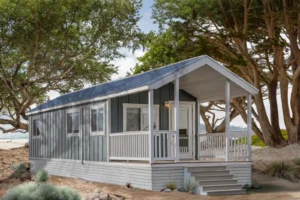 “Not everyone wants a log cabin. Some people want a more modern-looking park model,” Smucker admits. “Especially in beach communities or for luxury resorts. So, we’ve responded with more variety. These models will have a more traditional build, with framing and siding, rather than a log cabin structure.”
“Not everyone wants a log cabin. Some people want a more modern-looking park model,” Smucker admits. “Especially in beach communities or for luxury resorts. So, we’ve responded with more variety. These models will have a more traditional build, with framing and siding, rather than a log cabin structure.”
This expansion in style was made possible by a major operational investment: a new 15,000-square-foot facility dedicated exclusively to manufacturing these contemporary models.
“The new facility was needed because we cannot do anything other than log cabins on our log cabin lines,” he says. “It’s not as efficient as our main assembly line yet, but we’re getting there. The goal will be for it to become as efficient as the process for our log cabins.”
That efficiency will be critical, Smucker predicts, as demand continues to grow.
“There is a lot of interest in these innovative designs. They are selling really well,” he says.
Looking ahead, another shift may involve building out a dedicated design team. Currently, Smucker handles most of the design work himself — a process that involves significant collaboration with customers.
“At some point, I’d like to hire a designer to take that on,” he says.
At the heart of Lancaster Log Cabins’ operation is its streamlined manufacturing process. Housed in a 45,000-square-foot manufacturing facility, the company uses a 10-phase assembly line that produces two fully finished cabins per day.
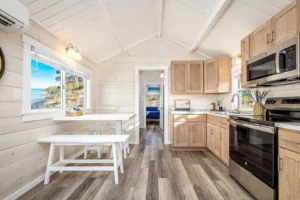 “From trailer frame to complete cabin in 10 days,” Smucker says proudly. “It’s old-school manufacturing efficiency.”
“From trailer frame to complete cabin in 10 days,” Smucker says proudly. “It’s old-school manufacturing efficiency.”
The assembly-line setup enables the company to fulfill large-scale orders for major campground operators. Sometimes that means producing 50 to 100 cabins for a single client, he says.
Though Lancaster Log Cabins prefers to stick to standardized models for efficiency, Smucker says the company occasionally takes on custom projects, especially when large orders justify the extra effort. Smucker remains hands-on in these cases, guiding customers through every detail, from floorplans and finishes to fixtures and siding.
“It’s time-consuming,” he says, “but when someone is ordering a significant number of units and wants something that fits their brand, we’re all in.”
Delivering an Experience
Whether customers are buying one cabin or 100, Smucker emphasizes service and integrity as the company’s core values. From fast response times to clear communication and prompt service on warranty issues, Lancaster Log Cabins strives to make each interaction count.
“When customers come to tour the factory and show cabins, we want them to feel appreciated and valued,” Smucker says. “We believe in doing the right thing — even in the little things no one else might notice.”
Service is a big part of the company’s success, he adds.
“With every phone call and every email, we get back to customers within 24 hours,” he says. “If someone says there’s a faulty range or fridge, we’re going to replace that item quickly. Little stuff like that goes a long way.”
One thing that makes Lancaster Log Cabins stand out is its direct-to-customer business model. The company doesn’t work with dealers.
“Customers like buying directly from the builder,” Smucker explains. “They can tour the facility, meet the team and see exactly how their cabin is made. We have show cabins on-site.”
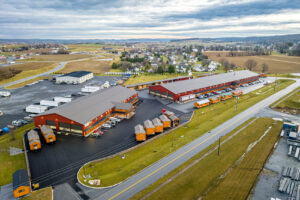 This approach has served the company well, but it may evolve as they scale. A new 70-acre site has already been purchased to support future expansion, including plans for a 150,000-square-foot building.
This approach has served the company well, but it may evolve as they scale. A new 70-acre site has already been purchased to support future expansion, including plans for a 150,000-square-foot building.
The move is still at least two years out, but it signals Lancaster Log Cabins’ ambition to remain at the forefront of the park model RV market.
As outdoor hospitality continues to grow — driven by rising demand for unique accommodations, short-term rentals and the ongoing appeal of tiny home living — Smucker is optimistic about what lies ahead.
He forecasts continued market growth, mirroring Lancaster Log Cabins’ expansion from producing 15 park models annually and having a handful of employees to manufacturing over 600 models a year and having 60 employees.
“People just want to get away,” he says. “And park models offer an affordable, comfortable way to do that — whether it’s at a campground or on a piece of private land. The park model market will continue to grow as the hospitality industry grows.”
With a focus on quality craftsmanship, expanding design options and a customer-first mindset, Lancaster Log Cabins is well positioned to meet that demand — log by log, cabin by cabin.

